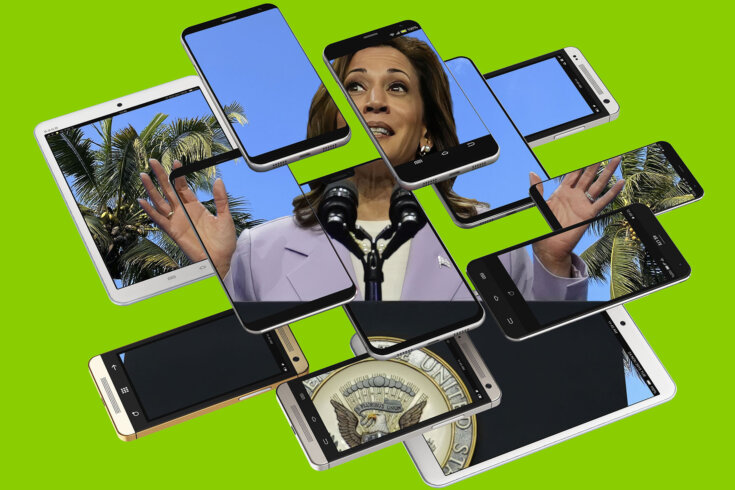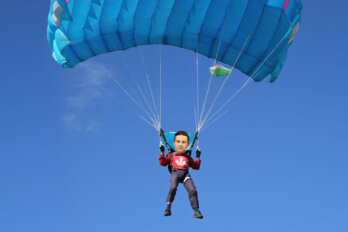In retrospect, the signs were there in April, when Drew Barrymore looked deeply into the eyes of United States vice president Kamala Harris and said, “We need you to be Mamala of the country.” The audience on Barrymore’s talk show cheered and whooped as Harris gave a polite, slightly pained smile.
On July 21, still fresh off a disastrous debate performance and following months of speculation and declining optimism about his lacklustre campaigning and doubtful mental acuity, President Joe Biden announced he was stepping down as the presidential nominee and endorsed Harris. Later that day, Charli xcx—the British singer whose acid-green album brat has set the definitive mood of the summer—posted “kamala IS brat” on X. Celebrity endorsements poured in; people began posting coconut emojis and declaring themselves “coconut-pilled,” a reference to a gnomic Harris sound bite; Harris soon released her first campaign video, soundtracked to “Freedom” by Beyoncé. By then, it was undeniable: Kamala Harris was a vibe.
Vibe has been the definitive description of Harris’s campaign so far, in part because its recency leaves little else to draw from. Her party platform is expected to follow the Democratic National Convention; until now, people have been forced to speculate about how she would govern. Her strongest asset is that she is not Joe Biden, and this undefined quality has been an early strength. Through her running mate choice of Minnesota governor Tim Walz—an experienced, relatable politician who has suddenly become the internet’s favourite dad—she has signalled her intent to continue stoking the fires of online adulation. Harris has swiftly closed the enthusiasm gap with Donald Trump, boosting the number of Democrats who intend to vote—particularly people of colour, women, and younger voters. Democrats who were disillusioned by Biden can foist all their hopes and dreams upon her; the possibilities of Mamala are vast enough to hold all of them—for the moment.
The spectacle is proving so effective that even Canadian politicians are attempting similar pyrotechnics, to fizzling effect. Witness environment and climate change minister Steven Guilbeault (or his beleaguered social media team) posting “affordable housing IS brat.” Or the fleet of Liberal MPs calling Pierre Poilievre “weird,” and Conservative politicians lobbing it right back, ever since Walz sharpened the unvarnished adjective into a deadly barb against his Republican opponents. These are clumsy efforts to generate their own Harris-like energy, like junior campers ineffectually rubbing two sticks together with the hope of making fire.
More than embarrassing, these efforts are deeply misguided. You cannot engineer a viral moment, particularly by attempting to laboriously reproduce one that emerged organically. But more importantly, the memes and pop culture moments are not the engine of Harris’s campaign. They’re the products of genuine excitement over the possibility she represents: a new opponent against Trump, which will force him to change his campaign tactics too. Prior to July 21, the events leading to the US election—if not its actual outcome—felt preordained: Biden and Trump yelling at each other about golf, exchanging the same insults we’ve heard a million times. Biden calls Trump a liar, an extremist, and a dictator; Trump mostly calls Biden “Crooked Joe,” an epithet so unimaginative it inspires nostalgia for his 2020 dalliance with “Joe Hiden’.”
Though Canada’s next federal election is likely a year away, a similar cloud of grim inevitability looms over it. We all know what a faceoff between Trudeau and Poilievre will look like: we are already inescapably familiar with their positions, their rhetorical styles, their talking points. There are no surprises ahead in a battle between these two leaders. Harris was a surprise, and so is the enthusiasm that has accompanied her campaign so far—the twist that threw a predictable plot off course.
There is nothing so potent in an election as the promise of change—almost always in the form of the opposing party. What makes the enthusiasm for Harris different is that she feels like a change agent, even though she isn’t one. Yes, electing the US’s first female president, particularly a woman of Tamil and Jamaican heritage, would represent a monumental shift in representation. But the extremely online memes and Ariana Grande endorsements are still savvy new branding on an old product. If Harris intends to deviate from the course laid out by Biden, she hasn’t given any indication of how; instead, she has realigned herself with his positions on wedge issues like assault weapon buyback programs, fracking bans, illegal border crossings, single-payer health care, and unwavering support for Israel despite evidence of war crimes against Palestinians. As American writer Brea Baker pointed out on a recent episode of the CBC podcast Commotion, “If people were as excited about the last four years, Biden wouldn’t even have needed to drop out.”
This new excitement has grown into a substantial wave, even if that savvy branding can go only so far. Following a Trump press conference, Harris’s team issued a release, written in the sardonic, internet culture–inflected parlance that has emerged to define Harris’s campaign voice, and headlined by a tweet from dril, the most notorious absurdist on social media. The press release, titled “Donald Trump’s Very Good, Very Normal Press Conference,” featured his 2014 tweet—a deep cut for the extremely online—that read “and another thing: im not mad. please don’t put in the newspaper that i got mad.” But attempting to harness the raw power of online culture for clout is perilous, as the Harris campaign learned when dril’s account reposted the release and added, “in case you thought the IDF Rape Camps were the worst thing our government is sanctioning.” Flying too close to the sun of online culture is risky, and as pop culture writer Stacy Lee Kong observed in her newsletter Friday Things, memes are useful tools only if they’re accompanied by policies that actually resonate with voters. “But if they’re just aesthetic, then the support they’ll garner is just as superficial,” she writes. As Harris solidifies from a coconut-emoji cipher to a real candidate, she’ll have to make it clear to voters what she actually stands for.
For a politician, familiarity is a hazard. In Canada, after nine years and three elections, people are tired of Justin Trudeau; insiders have warned of an enthusiasm gap. The Liberal share of the vote has declined with each election since 2015, and the Liberals are now expected to lose to the Conservatives in 2025. Voters and party members are not concerned about Trudeau’s age or mental acuity, only about his declining popularity and the loss of his once-legendary ability to energize and inspire supporters. To his left, the NDP has wilted, with political columnist David Moscrop musing that its only hope for renewal is the resignation of party leader Jagmeet Singh. Only Pierre Poilievre, as the challenger, has any momentum behind him. No wonder our politicians are grasping at memes in the hopes of regaining some kind of relevance.
In June, reporter and contributing writer for The Walrus Justin Ling overheard Guilbeault musing on the phone about a “campaign to show (Trudeau) the door” and naming several Liberal MPs who felt it was time for the prime minister to step down, according to the Toronto Star. Harris mania has undoubtedly solidified the belief of many who think the Liberal Party’s best chance of winning lies in replacing Trudeau with a fresh face. Whether the electorate can be convinced this represents a meaningful transformation is another question. But any politician hoping to bottle the Harris campaign magic would do well to consider its true origin point: the belief, however ephemeral, that politics can still defy our expectations.





